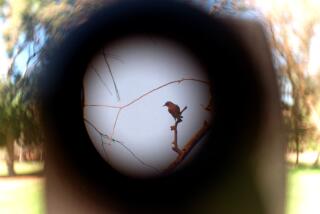Mother nature’s son
- Share via
WHEN Charles Darwin was in his later years and famous, a research team of German phrenologists paid him a visit. Surely such a remarkable man must enjoy remarkable head bumps. Among the most remarkable, they discovered, was the Bump of Reverence on his crown: 10 times as prominent as most people’s.
Reverence is the theme of “Pilgrim on the Great Bird Continent”: part philosophical ramble, part personal journal and part a rethinking of Darwin’s character and life. It is an odd book, woolly and self-indulgent at times but breathing here and there -- when it doesn’t breathe too hard -- with a note of provocative originality.
“God or Darwin”: This might sum up in poster form the reaction against evolution and natural selection that has endured in recurring cycles to this day. If Lyanda Lynn Haupt had written a poster instead of a book, it might read “God in Darwin.”
She treats the great shaker of the 19th century’s religious assumptions as a man of reverence, of faith, even. It was a faith quite different from that of today’s creationists, though, at the outset, while he was collecting skins and bones on the five-year journey of the Beagle and had not yet analyzed what he had found, he was a kind of loose creationist himself.
The reverence that Haupt insistently draws out of Darwin’s travels and writings was directed not at God but at Nature, not at some direct divine source for its immense variety but -- so the writer suggests -- at the much more awe-inspiring processes that achieved it.
(Amid writing that sometimes superheats, it is a chill pleasure when she quotes 20th century British geneticist J.B.S. Haldane. Asked what he thought of God, Darwin’s much less reverent follower -- having in mind the endless variety of insect species -- meanly suggested that he “must have an inordinate fondness for beetles.”)
Haupt declares at the outset that she hopes to supply an element missing in most accounts of Darwin’s travels and writings. Those accounts emphasize his scientific conclusions and logical apparatus. What she is mainly interested in is the deeper human dimension behind them. She is after his uncertainty, his poetry, his passion.
What Haupt wants to bring out is the man having lunch in the Brazilian forest, lying on his back for hours to watch the flight of a vulture or riding on the back of a giant Galapagos tortoise. She excavates the lyrical bits in his notes. Of a flycatcher, he remarks on its “fine orange feet.” She seizes upon the word “fine” as a touch of personal rather than scientific passion.
There is more of this as she follows Darwin on and off the Beagle, all but squeezing into his cabin. She scolds him for paying more attention to Brazilian bugs than to birds (ornithology is her passion), then forgives him when he goes for birds in a big way in Uruguay and Argentina.
Sometimes she takes on excessive coziness (“Ha, me too!”) when Darwin writes that he could use a secretary. She makes an odd excursion or two, one that somehow involves medieval poet Hildegard von Bingen and the word “verdancy.” Her methods can be a little goofy, but there is a serious meaning to be glimpsed through the distractions. She has some arresting points to make.
Haupt’s seizing upon Darwin’s humanity is not simply anecdotal. Rather, this emphasis illustrates her conviction that before and beyond scientific exploration there must be a motor that powers it: a passion for nature and its proliferating forms.
When Darwin wrote that the Galapagos was “the origin of all my views,” Haupt suggests that this origin was in part spiritual, that finding himself absurdly astride that tortoise was as profoundly shaping as the notes he carried back to London.
It is not religion, exactly, but a reverence akin to it. Later writers have condescended to Darwin’s tendency in his notes to write of his creatures in terms of human qualities: Anthropomorphism is a taboo. Yet Haupt sees in it, interestingly, a process leading to Darwin’s work on evolution: from one link, the human in animals, to another, the animal in humans.
She goes on to express concern at what she argues is the loss of such human connection in contemporary science. After Darwin crushed a nest of tern eggs by stepping on it, he learned to kneel or lie prone to watch. He got dirt on his clothes. Haupt word-plays the Latin “humus” and goes on to extract “humility.”
It is humility, the dirt on the clothes, the bodily involvement, the rigorous travel that she finds in danger of disappearing. The naturalist, going out and studying whole organisms, gives way to the molecular biologist. A doctorate in ecology, Haupt writes, can be earned by statistical study on the computer, with no need to leave the campus. Darwin, today, might well be unable to earn a doctorate. Something is gained but a lot -- reverence, say -- is lost. *
More to Read
Sign up for our Book Club newsletter
Get the latest news, events and more from the Los Angeles Times Book Club, and help us get L.A. reading and talking.
You may occasionally receive promotional content from the Los Angeles Times.







